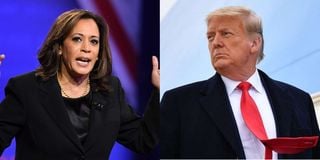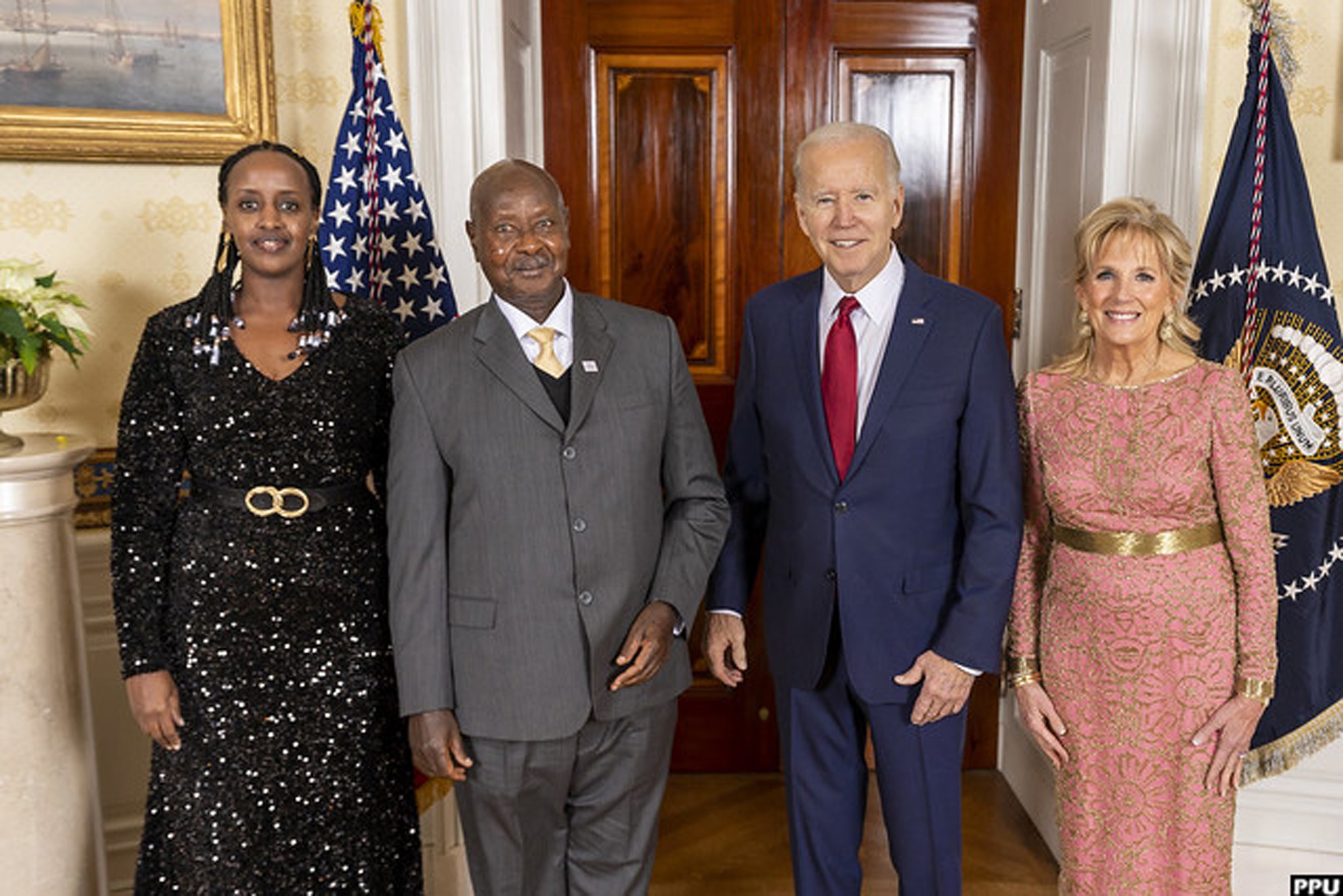
US Vice President Kamala Harris and former president Donald Trump.
The United States goes to the polls on Tuesday, November 5 in a neck-and-neck race between former president Donald Trump and Vice President Kamala Harris. So tight is this toss-up race that both candidates stand a chance of occupying perhaps the most important leadership position in the world.
As the world waits with bated breath, what are the implications for a Harris or Trump for Africa?
When you look at the overall US policy toward Africa, you realise that it has remained for decades with variations from one administration to another. Those expecting a change in US-Africa relations with the election of either Trump or Harris would better tamper their optimism with doses of this reality.
US elections are consequential to the whole world, thanks to the US’ superpower status. The US Gross Domestic Product (GDP) is over $28 000 with its main competitor, China’s GDP, at about $18, 000. This trade and economic prowess is matched by military and technological advances which confers political power like no other in the world. US presidents have not shied away from projecting this comprehensive power globally.
US presidents, however, prioritise their Western allies, traditional competitors, and emerging powers over an Africa that is low on the Washington agenda. The starting point for an analysis of either a Trump or Harris administration post-elections must be the global implications of either of them. The most consequential lens through which the impact of US elections is a geopolitical viewpoint.
Multilateralism
Under the Make America Great Again (MAGA), Trump would begin his second presidency by pulling the US out of the United Nations organizations as he did in 2017. The US would recede from the global stage. Harris on the other hand would continue with the US’ involvement in multilateralism.
Throughout the raucous campaign period, neither Harris nor Trump has made any significant statement on their vision of US-Africa relations. This confirms the reality that Africa is on the lowest end of US priorities globally. Instead, both Trump and Harris have taken positions on US relations with the Northern Atlantic Treaty Organization (NATO), the principal formation of the Western world.
A reading of Trump’s position on NATO and Europe more broadly indicates that he will roll back relations as he did during his presidency between 2017 and 2020. If Trump will scale down support for Western allies with cutbacks in the financing of NATO operations, what can be expected of his engagement with Africa? It is palpable that Washington’s interest in Africa, let alone engagement, will fall farther down and back on Washington’s global priorities.
Interestingly, when Kenya’s President, William Ruto was feted with a State Visit to the US in May, Kenya was designed as a “major non-NATO ally”. In a Harris administration, Kenya’s position would take shape perhaps in the form of donations of military equipment and enhanced training for its security forces. In a Trump administration, Kenya’s NATO designation would come to an end even before it takes shape.
Both Trump and Harris have articulated their plans for engaging with Russia and China. Trump has indicated that he would lean on Ukraine to sue for peace with Russia in the ongoing war between the two Eastern Europe countries. Evidence of this has come in the form of allegations that actors working on behalf of Russia have escalated digital media-driven support for Trump while escalating anti-Harris propaganda. Moreover, it is generally thought that Trump is sanguine towards Vladimir Putin while Harris and the Democratic Party more generally see Putin as the foremost foe of the US.
The implication for Africa is that food and commodity prices would fall should Trump successfully persuade Ukraine to cede territory to Russia and forego its campaign to join NATO – these being the contentious disputes fuelling the war. Should Harris win, she would likely continue Joe Biden’s military and political support for Ukraine which will in turn sustain the economic woes that have spilled over into Africa. Some have gone as far as to suggest that the Russia-Ukraine war might escalate into a third-world war, in which Africa would be sucked.
Change tack
Quite interestingly, it is unlikely that either a Trump or Harris presidency would change tack as far as the Israel-Palestine war and the broader Israel-Iran tensions are concerned. Both Trump and Harris have taken strong positions in support of Israel. Most African nations, with South Africa in the lead, have taken positions in support of Palestine. In its various pronouncements on the matter, the African Union has condemned Israel’s occupation of Palestine and the West Bank. The upshot is that Trump or Harris would face the problem of an Africa that is at variance with its military support for Israel.
Both Trump and Harris have made China a key campaign issue. In matters of scale, however, Trump has been stronger than Harris in articulating his intent to initiate tough trade policies toward China. While Trump would likely punish African countries that deal with China – directly and indirectly – Harris would likely seek more persuasive ways of co-opting African nations away from China. In a Trump administration, a trade war with China is almost inevitable, particularly on the agricultural, manufacturing, and digital technology fronts.
At least two consequences would ensue for Africa. First, the Chinese would pivot to Africa and other regions of the world to plug the loss of American markets. Second, should the US sanction Chinese companies, Trump would require that African countries equally desist from trading with them. Third, African countries would probably defy the US and continue trading with Chinese companies.
This would lead to friction between the US and African nations. It can be recalled that Trump touched off a trade war with China in these sectors in 2019, African leaders, Cyril Ramaphosa (South Africa), Paul Kagame (Rwanda), and Uhuru Kenyatta (Kenya), openly rejected Washington’s call for them not to deal with China.
Even though Africa is at the lowest ebb of US foreign policy, it occasionally climbs up the agenda from one administration to another. Analysts concur that the Bill Clinton and George W. Bush presidencies were the epochs in the 1990s and 2000s while Africa somewhat rose in Washington’s engagement with the continent. Clinton launched the African Growth and Opportunity Act (AGOA) which permitted preferential export-import of African goods and products into the US market. Bush initiated the President’s Emergency Plan for AIDS Relief (PEPFAR). Both have enjoyed bipartisan support in the US Congress and were retained by the Trump and Biden administrations.
By contrast, Trump not only neglected relations with Africa during his first term but went as far as denigrating the continent, using coarse language. Given this context, it is uncertain that Trump would support the renewal of AGOA which expires in the last quarter of 2025.
On assuming office in 2021, Joe Biden’s administration sought to repair relations. A key development was the August 2022 “US Strategy Toward Sub-Saharan Africa” by Secretary of State Antony Blinken. This was the first US policy toward Africa in a decade, following President Obama’s policy released in 2012. The 2022 US policy was followed by the “Africa-US Leaders’ Summit” during which Biden hosted some 49 African leaders and the leadership of the African Union.
Likely, Harris, who was on hand to discuss and negotiate with several African leaders, would continue implementing the policy agendas she was involved in crafting. Among the initiatives that Harris would inherit from Biden is the President’s Advisory Council of African Diaspora Engagement (PAC-ADE), an agency in the State Department.
This entity, established by executive order in 2023, has served as a diplomatic avenue for engagement across cultural, political, and economic domains. It is unlikely that Trump would rescind this executive order lest he draws the ire of African Americans and more recent African immigrants. But this entity will likely become moribund under a Trump presidency.
Social issues
Trump and Harris have starkly different visions on social issues, key among them the question of LGBTQ. The US considers LGBTQ rights as human rights that should never be flouted. On the other hand, most African countries are conservative, not allowing same-sex relationships or only tolerating them. The Biden administration pushed hard against these anti-LGBTQ legislation and violations in countries such as Uganda and Ghana.
While not too vocal about LGBTQ issues, the Trump administration between 2017 and 2020 aligned with his conservative evangelical Christian base which is also anti-LGBTQ. Should Harris Win, it can be expected that the pro-LGBTQ agenda will remain on the US agenda towards Africa. Should Trump triumph, the LGBTQ agenda is likely to fizzle out.
Trump’s approach to leadership is a transactional one. Among the positive aspects of his policy towards Africa was the launch of Prosper Africa, a one-stop entity coordinating trade deals between US economic agencies and their African counterparts. African countries looking to do business with Africa would have to focus on deals under Prosper Africa, particularly those in the energy sector.
It remains to be seen but quite likely that Trump would favour bilateral trade agreements rather than broad initiatives such as the African Continental Free Trade Area. For instance, in 2020, the US entered into a Free Trade Area negotiation with Kenya at a time when the AfCFTA was being heavily promoted.
Dr Wekesa, is the Director, African Centre for the Study of the United States, University of the Witwatersrand





